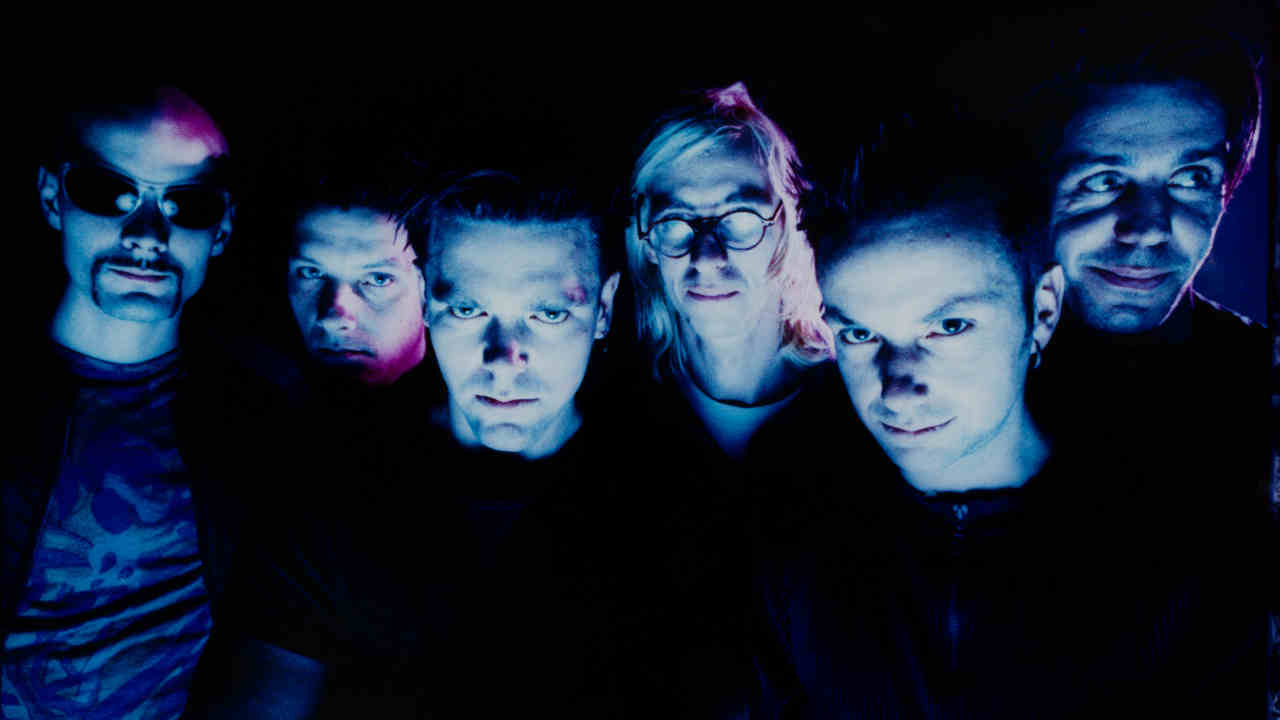The Story Behind The Song: Rammstein’s Du Hast
How Du Hast introduced Rammstein and their exploding dildos to the world

Select the newsletters you’d like to receive. Then, add your email to sign up.
You are now subscribed
Your newsletter sign-up was successful
Want to add more newsletters?

Every Friday
Louder
Louder’s weekly newsletter is jam-packed with the team’s personal highlights from the last seven days, including features, breaking news, reviews and tons of juicy exclusives from the world of alternative music.

Every Friday
Classic Rock
The Classic Rock newsletter is an essential read for the discerning rock fan. Every week we bring you the news, reviews and the very best features and interviews from our extensive archive. Written by rock fans for rock fans.

Every Friday
Metal Hammer
For the last four decades Metal Hammer has been the world’s greatest metal magazine. Created by metalheads for metalheads, ‘Hammer takes you behind the scenes, closer to the action, and nearer to the bands that you love the most.

Every Friday
Prog
The Prog newsletter brings you the very best of Prog Magazine and our website, every Friday. We'll deliver you the very latest news from the Prog universe, informative features and archive material from Prog’s impressive vault.
You might not know what the words mean, but you know what the words are. “Du. Du hast. Du hast mich.” The thudding, call-and-response genius of Rammstein’s breakthrough 1997 single is their Smells Like Teen Spirit: you never need to hear it again, but you’re glad when you do. It’s the song that broke them in North America, the song that’s remained a staple in their live set no matter what, and the song that does the big boy numbers on Spotify.
Du Hast is what propelled Rammstein into metal’s upper echelons, setting them up for decades of porno shoots, self-flagellation, god-tier pyrotechnics, retina-bursting music videos and general disregard for taste.
Born from a recently reunified Germany in ’94, the industrial metal newbies had already enjoyed a fair amount of native success with their debut album, Herzeleid. They’d started making waves through mainland Europe too, in no small part due to frontman Till Lindemann’s ambitious antics on stage, which involved wearing a chainmail trench coat and setting it on fire, spewing flames barely 10 feet above audience’s heads at open-air festivals, fire in the – you get the idea.
- The best Metallica merch 2020: amazing gifts for the Metallica fan in your life
- Best record players: turntables your vinyl collection deserves
- The best bluetooth speakers you can buy right now
- The best phones for music lovers
They were a curio, and word was getting out. David Lynch’s Lost Highway, a neo-noir cult film released to the North American market in February 1997, featured the songs Heirate Mich and Rammstein, both taken from Herzeleid. No surprise, really, given Nine Inch Nails main-man and industrial metal messiah Trent Reznor had assembled the soundtrack.
Thus album number zwei, Sehnsucht, grew alongside Rammstein’s reputation. Recorded at the tail-end of ’96 through ’97, the same democratic, drawn-out process the band are now infamous for plagued the sessions: they write a song, take it to Till, record it, spy on the producer as the music is mixed, proceed to bicker over what needs changing, then leave poor guitarist Paul Landers to deliver a flurry of notes to the equally unfortunate producer, who has to somehow appease six wildly disparate opinions. Well, that’s what Paul said, anyway. Drummer Christoph ‘Doom’ Schneider has gone on record claiming this period was somewhat less democratic, with guitarist Richard Z. Kruspe’s overbearing influence threatening to destroy the band. “Richard tried to lead the band, and that reached the point where we couldn’t stand it anymore and we almost broke up,” Christoph told Metal Hammer in 2009.

They must have done something right, as Du Hast came fully-formed from those sessions, flying in the face of the nu metal revolution rolling across the globe; bands like Korn, Limp Bizkit and, lest we forget, Insane Clown Posse had captured the zeitgeist, dressed it in baggy jeans and forced it to chug two pints of Faygo.
Du Hast fit right in, by virtue of sounding nothing like any of those bands. Its pounding, militaristic drumbeat supports a riff reminiscent of Ministry’s Just One Fix, but less heroin-y; Till’s rich, bassy voice juxtaposes Christian ‘Flake’ Lorenz’s cheeky, video-games-meet-goth-club synthesisers across the song’s four-minute duration.
Sign up below to get the latest from Metal Hammer, plus exclusive special offers, direct to your inbox!
It’s heavy. It’s catchy. A dancefloor-filler. Verse, chorus, verse; in, out, done. Banger. It’s within this relative simplicity where Till hides his lyrical dexterity, which is often missed by us English-speaking pillocks.
The gist of Du Hast is homophonous. ‘Du hast’ = ‘You have’. ‘Du hasst’ = ‘You hate’. They sound the same. It’s ambiguous, as is the chorus, which you’ve no doubt mangled in an abattoir of vowels whenever you’ve sung it: ‘Willst du bis der Tod uns scheidet, Treue sein für alle Tage.’ Which, roughly translated to gibbon’s English, is something along the lines of: ‘Do you want, until death separates you, to be faithful to her for all days?’ Wedding vows, essentially.
“This song is actually about a kind of loyalty,” said Richard at the time. “We see Rammstein like a kind of family. We have a strong awareness, a strong sense of tradition in this band. And for me, this song is a bit like that promise of faith we know from weddings, that’s kind of been integrated into this family.”
Written as above, that line in the chorus does suggest something soppy and nuptial. But then, in the penultimate refrain, Till switches it up: ‘Willst du bis zum Tod, der Scheide, Sie lieben auch in schlechten Tagen?’ Depending on where you apply stress to that sentence, it can mean: ‘Do you want her, until death separates you – and also love her during bad days?’
Or, it can mean: ‘Do you want her, until the death of the vagina – and also love her during bad days?’ Coming from the man who, twelve years later, wrote a song with the chorus, ‘You’ve got a pussy, I have a dick, so what’s the problem, let’s do it quick’, our money’s on the fruitier translation.

Naturally, the American public were none the wiser. US radio got its claws on the single in the summer of ‘97, which snowballed into MTV coverage – the track’s iconic, revenge-fueled video video actually saw the network sack off a new Smashing Pumpkins single, in order to bump Rammstein up to a heavy-rotation slot. The novelty of the rolled ‘r’ sounds, the unabashed way in which the band embraced their inherent Germanic qualities, the mental video is what drew people in. The music is what kept them there.
This steely, seemingly uncompromising effort from Rammstein is actually the one moment when they second-guessed themselves, though. Despite Till saying that writing Rammstein songs in English is "like asking the Buddha to kill a pig or something”, some Japanese, US and Canadian editions of Sehnsucht do carry English-language versions of Du Hast and its other heavyweight single, Engel. And it’s weird. The flow, the charm, the emotion is lost. The double entendre stuff doesn’t work.
“We did it, and then we were listening to the song, and all of a sudden the whole song didn’t work anymore,” Richard told Metal Insider in 2018.
Thankfully, the original version prevailed. Sehnsucht cracked the US Billboard Top 50 – a gargantuan feat for a German-language heavy metal album that not only features an ode to a dying vagina, but also a song about sodomy. Rammstein appeared in Condé Nast’s lifestyle monthly Details Magazine, replete with their Du Hast masks and Flake on the floor, shirtless and sporting a ball gag. The song featured on The Matrix’s soundtrack album, back when soundtrack albums actually made money.
- Rammstein Deutschland: the song and video, explained
- Rammstein's Christoph 'Doom' Schneider: My Life Story
Du Hast gave Rammstein the platform they needed to show the world what fucked-up looks like – they performed at the MTV Europe Music Awards 1998, singeing pretty much everyone with that spark-spewing bow you see Till muck about with during Du riechst so gut nowadays.
Towards the end of the year, they toured the States with Korn and Limp Bizkit for the Family Values package, being dragged off stage and arrested at the Fairfax date. Their alleged crime? Walking on stage with nothing but gaffa tape covering their würste. This incited a riot, albeit a good-natured one.
Being so unbelievably at odds with ‘cool’ is what’s kept Rammstein relevant for all these years – Du Hast absolutely fits into that tapestry of middle fingerism, the song mutating from an oddity by some weird metal band to an integral, momentous set-piece for one of the genre’s biggest acts. Sure, there’s more pageantry and occasion when it’s played today, Till firing a rocket above the crowd, said rocket zooming back and showering the band with a flurry of sparks. But the reason why Du Hast worked – and still works – is because it’s a great song.
If you can, forget the simulated sodomy, the exploding babies, the giant cooking pot, the visage of Till’s package etched into your mind. Get rid of the stage show, the perceived gimmicks, all the stuff people tell you Rammstein use as a crutch. Du Hast’s still there, marching to the beat of its own drum.

Alec is a longtime contributor with first-class BA Honours in English with Creative Writing, and has worked for Metal Hammer since 2014. Over the years, he's written for Noisey, Stereoboard, uDiscoverMusic, and the good ship Hammer, interviewing major bands like Slipknot, Rammstein, and Tenacious D (plus some black metal bands your cool uncle might know). He's read Ulysses thrice, and it got worse each time.

